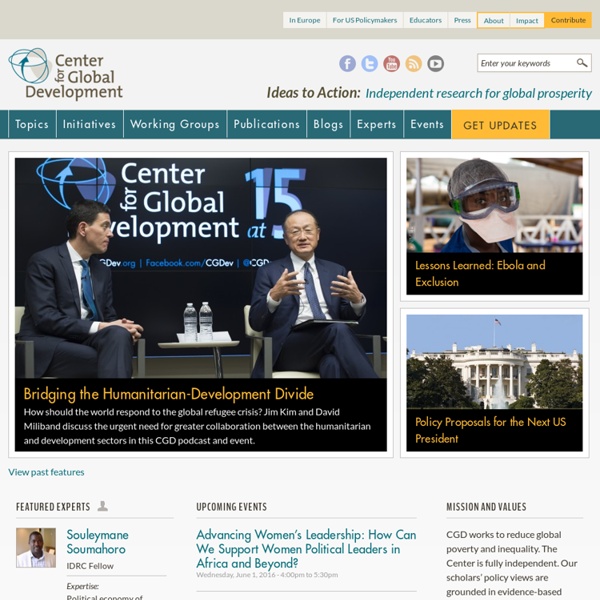



Media and Culture Journal M/C Journal was founded (as "M/C - A Journal of Media and Culture") in 1998 as a place of public intellectualism analysing and critiquing the meeting of media and culture. M/C Journal is a fully blind, peer-reviewed academic journal, but is also open to submissions and responses from anyone on the Internet. We take seriously the need to move ideas outward, so that our cultural debates may have some resonance with wider political and cultural interests. Each issue is organised around a one word theme (see our past issues), and is edited by one or two guest editors with a particular interest in that theme. Vol 23, No 1 (2020): dream Edited by Lorna Piatti-Farnell and Emerald L.
Microloans to Africa | Grow business through microfinance RBF Homepage | RBF Health Redelaldía Global Voices - Global Voices | Strengthening Governance Through Participation Connaître le Groupe ESFIN-IDES Putting the new development policy into practice | MinBuZa News article | September 20, 2011 ‘This will be the year of development policy modernisation,’ said development minister Ben Knapen about his 2012 budget. ‘Now that we’ve decided the amounts, the embassies in our 15 partner countries can set to work on our new development policy priorities.’ The new priorities are water, food security, security and the legal order, and sexual and reproductive health and rights (SRHR, with fighting HIV/AIDS as a major component). These are all issues that the Netherlands, its business community and its knowledge institutions are good at and on which they have added value to offer. The country will spend €114 million more on these priorities in 2012 than in 2011: €181 million on water, €219 million on food security, over €385 million on security and the legal order, and €335 million on SRHR. ‘We will be making joint, targeted investments in developing countries in economic development, security, stability and the legal order,’ said Mr Knapen.
Our World Digitized: The Good, the Bad, the Ugly | MIT World La Nef .: Accueil :. Votre partenaire financier pour une économie plus humaine Frequently asked questions on the Aid Budget 2012 The development cooperation budget corresponds to one per cent of estimated gross national income for 2012. This means SEK 35,8 billion. This includes for example costs from other parts of the central government budget that are classified as development assistance, such as the reception of asylum seekers, costs for Sweden's contributions to the portion of EU development aid that is financed from the regular EU budget as well as the regular budget of certain UN bodies to the sum of SEK 5,5 billion. What is the Government doing to strengthen efforts for democracy and respect for human rights within development cooperation? Democracy and increased respect for human rights are one of the Government's priority areas and the largest sector within Swedish bilateral development cooperation. The Government is allocating around SEK 90 million for an enhanced level of ambition in this area, meaning increased support to actors for change working for democratisation and freedom of expression. Up
World Values Survey PhiTrust Active Investors - Donnez du sens à vos investissements - Société de gestion d'actifs - Engagement Actionnarial